A Conversation With Nora Roberts
by Claire E. White
The year is 1979. A blizzard is raging outside. Kindergarten has been canceled, the house is bereft of chocolate and two bored boys are driving their young mother nearly to distraction. After days of board games, she gets an idea -- she picks up her pencil and some paper and begins jotting down ideas for a story. She likes to read Harlequin romances and thinks she has an idea that might work. So she scribbles the story on various sheets of paper -- whatever is
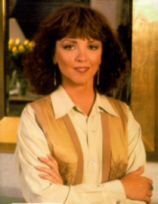
|
She has over 42 million copies of her books in print and by the end of 1998 will have published 126 books. Six of her titles were New York Times bestsellers in 1997 alone. All the major critics have raved over her books as do her legions of loyal fans who line up to buy her latest novel.The winner of the Lifetime Achievement Award from the Romance Writers of America, she is one of romance's most prolific authors. But what sets her apart is the originality and versatility of her writing. She writes mainstream romantic suspense e.g., Homeport (Putnam, 1998) and Sanctuary (Jove, 1998), category romance e.g., The MacGregor Brides (Silhouette, 1997), and futuristic mystery novels under the pseudonym J.D. Robb, e.g., Holiday in Death (Berkley, 1998). Her talent for creating vivid settings is unmatched as is her ability to draw the reader almost immediately into the lives of her characters.
The youngest of five children, she was born in Silver Spring, Maryland. She now lives in Keedysville, Maryland with her husband. When she is not drafting or revising her latest novel at her computer in her home office, she can be found sipping an espresso at the family bookstore, traveling to promote her books, spending time with her family, gardening or catching the latest episode of the X-Files. She is a sought-after speaker at writers' conferences where she has inspired countless fledgling writers with her message: make time for your writing -- don't make excuses, if you ever want to be a successful author. When asked how she deals with writer's block, she truly seems to find the concept baffling -- she has more ideas for stories in her head than she could ever write in one lifetime.
Nora spoke to us about her latest bestsellers: Homeport and Holiday in Death, how she gets her ideas and how she survived the worst episode of her professional life: last summer's scandal when romance superstar Janet Daily admitted that she deliberately plagiarized Roberts' work.
What led up to the publication of your first novel in 1981, Irish Thoroughbred? What made you write your first book?
The Blizzard of '79, two small children, no morning kindergarten, endless games of Candyland and short supply of chocolate. All of these things and events led up to me writing my first book. I live in the country and was snowed in with my then three and six year old sons. Going crazy. I'd always loved to read -- and come from a family of readers -- but I never thought about writing as a career. I thought everyone made up stories in their heads. During the blizzard, as the radio announced day after day there would be no morning kindergarten, and my horde of Oreos was depleting, I was desperate. To entertain myself I decided to take one of the stories out of my head and write it down.
The minute I started, I was hooked. I loved the process of writing. I decided to write category romance as I'd recently discovered them, and enjoyed them. At that time, there were only Harlequins, and they were primarily written by British authors in the British style. For over a year I continued to submit mss, and have them rejected -- the last few with rejection letters indicated the story was pretty good, but I was American. (laugh) Then in 1980, Silhouette opened up looking for new, American writers to put an American spin on the Harlequin framework. It was, for me, wonderful timing. In the summer of '80, Silhouette bought my first book.
Take us through a typical day in the life of Nora Roberts.
Typical? I long for typical days, but rarely get them any more.
| "I've never taking a course on writing. I've never read a book on writing. This isn't something that would work for me. Every writer has to figure out what works best -- and often has to select and discard different tools before they find the one that fits..." |
Tell us about your husband's bookstore.
We just love our bookstore. Turn The Page Bookstore Cafe is right on Main Street in the little town of Boonsboro, Maryland. We carry all new books. It's a small store, and I have to say my husband has made it really charming and friendly. He works incredibly hard to insure good customer service, both in store and mail order. Over the last year or so, he's been doing a lot of business on the Net. He carries a wide variety of fiction -- heavy on paperbacks. He also offers quite a number of autographed books (not just mine!). He also has a solid section of Civil War books -- fiction and non-fiction -- as we're in the middle of Civil War country. The store also offers really marvelous coffee -- the traditional type and all the fancy types. Muffins, biscotti, cookies, that sort of thing. My oldest son, Dan also works there. As does our invaluable salesperson Ruth. I love dropping in when I have time. It has such a nice atmosphere.
How do you approach writing scenes of passion?
Exactly the same way I approach writing any other scene. Action, reaction, motivation, emotion, all have to come from the characters. Writing a love scene requires the same elements from the writer as any other.
Does your husband read your love scenes?
If you mean does he preview them, absolutely not! (laugh) He doesn't read any of my work before it comes out. Then he reads the whole book.
How much do you use the Internet?
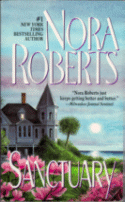
|
Do you believe it is important for authors to be online?
I think it depends on the author and what they want to do, what they enjoy. I really enjoy being on line. I would certainly say that any author should try it. For the research without question. For communicating with readers, I find it simply marvelous. And it gives me a lot of laughs. I've gotten to know a number of readers from being online, and really treasure the time I've spent with them.
How much interaction do you have with your fans?
Quite a bit. Through the Net on just about a daily basis. Then as I've met readers through the Net, I've been able to meet many IRL. A lot of readers have come to our store for signings or just to visit. When I travel on book tours and business, I've been able to meet several others. I post on the boards often, and try to answer all reader e-mail within a week or two at the most. For me, it's enormously satisfying to know there are people out there who enjoy my work enough to want to tell me so. I appreciate that tremendously.
Do you have time to read other authors? Whose work do you like to read?
I don't think you can write -- at least not well -- if you don't love stories, love the written word. One of my greatest pleasures is falling into a story someone else has written. I read a lot -- and I read a variety of genres. I really enjoy my pal Patricia Gaffney's work, and was delighted to be able to do an anthology with three other pals, Ruth Ryan Langan, Marianne Willman and Jill Gregory, whose work I enjoy. I also love John Sandford's Prey series, Sue Grafton, Linda Barnes. I think Elizabeth Berg is incredible. Mary Stewart will always be my goddess. I can pick up one of her early books -- one I've read a dozen times -- and still slide right into the story.
You started your career writing category romances, which have strict parameters about the subject matter, how passionate the romance can be etc. Have you ever felt the parameters of a certain subgenre to be too confining for you? Do you ever find it difficult to write within those strict guidelines and yet stay true to your creative vision?
I've never felt category is restrictive. If you write in category, you write knowing there's a framework, there are reader expectations. If this doesn't suit you, you shouldn't write it. I don't believe for one moment you can write well what you wouldn't read for pleasure. For myself, I've always felt that if you remember those expectations, if you focus on the ongoing relationship between the hero and heroine, category can be amazingly flexible. You can add mystery, paranormal, science fiction, meladrama, comedy. Category has offered me a wonderful canvas on which to paint -- they might be quick, charcoal sketches rather than the more detailed or sweeping oils I do outside of category. But art is still art.
Your latest hardcover is Homeport, a sweeping tale with passion, suspense, intrigue and a fascinating look into the art world. What was your inspiration for the story?
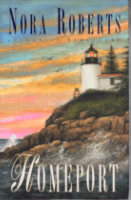
|
Homeport has a lot of technical information about the authentication of art. How did you do the research on this subject?
On the Net, where else?
You are known for your ability to write believable and fascinating male characters, from the charismatic patriarch of the MacGregor Clan, Daniel MacGregor, to the three Quinn brothers in Sea Swept. Where do you get your insight into the male mind?
First, I really believe that since writer is a term without genre, a good one should be able to write believable male and female characters. But I think I have a bit of an edge on the male as I was the youngest of five. Four older brothers. I have two sons. No daughters. I've been outnumbered by men all my life. It was figure them out or run screaming.
Sea Swept was the first of a new trilogy starring the three Quinn brothers. When will we see the next installment in this series? Can you give us a sneak peek into the plot?
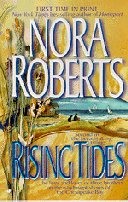
|
I'd like to talk about the "In Death" books, the futuristic series which you write under the name of J.D. Robb. How did that series come into being? What do you like best about writing this series?
I write quickly, which can cause some inventory problems in (publishing) house. My editors and my agent had all suggested writing under another name so I could keep up the pace that's comfortable for me. I resisted. Just didn't
| "The plagiarism, and dealing with the fallout of it, was the most difficult thing I've ever faced since I started writing." |
How did you go about creating the world of New York in 2058?
I just more or less imagine what I'd think -- and like it to be. I believe people are fairly constant. Certainly emotions are. Love, hate, greed, courage. But the toys change. The AutoChef was my first pick -- a gift from me to every one who has to answer that thorny question night after night. What's for dinner? In these books, I've more or less created a world. I have to see it, create the rules as well. Then I have to stick to them.
The latest book in that series is Holiday in Death which pits Lieutenant Eve Dallas on the trail of a ritualistic serial killer who seems to be working through a dating service of the future, where part of the service is a total physical makeover. What was your inspiration for this book?
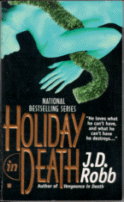
|
For aspiring romance writers, how important is it to take writing classes or read writing books?
I think this is completely a personal and individual decision. I believe strongly in writing groups such as Romance Writers Of America that offer support, information and networking. I think writing classes can certainly help a new writer with the nuts and bolts if they're rusty. I know some writers who've found certain books on writing to be helpful. Now, I'll say this. I've never taking a course on writing. I've never read a book on writing. This isn't something that would work for me. Every writer has to figure out what works best -- and often has to select and discard different tools before they find the one that fits.
What is the greatest change in romance publishing that you have seen since you began writing?
I suppose the opening up of the market -- the fluidity of it. The fact that, as I mentioned earlier, romance will absorb and incorporate so many elements from so many other genres and still remain true to its form. Also, certainly, the more balanced presentation of the hero. By giving him a point of view, by knocking him off the richest man in the free world pedestal and putting, most often, him and the heroine on equal ground. At the same time, the heroine has become stronger and more independent. I think you can credit Americanization with this. When American writers embraced the category form and began to make it theirs, our women became sharper, stronger and more accessible to the reader.
Last summer, you had to endure a nasty episode where another author plagiarized your work. Have you managed to put that episode behind you? Has it affected your outlook permanently in any way?
The suit I filed against Janet Dailey has been settled. The four books, Notorious, Aspen Gold,Tangled Vines and Scrooge Wore Spurs were named in the suit as well as the more than a dozen of mine which were copied from. Part of the settlement includes having a team compare several more books to ascertain the extent of copying. Once that's done I can put the entire matter behind me. At this point, I'm very relieved to have the suit settled. I hope it hasn't affected my outlook negatively. I wouldn't want to have to go through this again, which is only one of the many reasons I filed the suit. I feel strongly that plagiarism is the line no writer can cross, and if it is crossed, must be dealt with firmly. I had to stand for my work.
You do a lot of traveling with book tours, speaking engagements etc. How do you find the time to write -- do you write on the road?
You don't find time to write. You make time. It's my job. What I do. I do indeed write on the road. My laptop goes with me everywhere.
What is the greatest challenge you have faced in your career as an author?
Every single book is a challenge. No matter how many you've written, you've never written this one before. And each book has to receive your best effort every single time. No slacking. But that's the job. I'm lucky to love my job. Certainly the plagiarism, and dealing with the fallout of it, was the most difficult thing I've ever faced since I started writing.
Return to the June 1998 issue of The IWJ.
More from Writers Write
